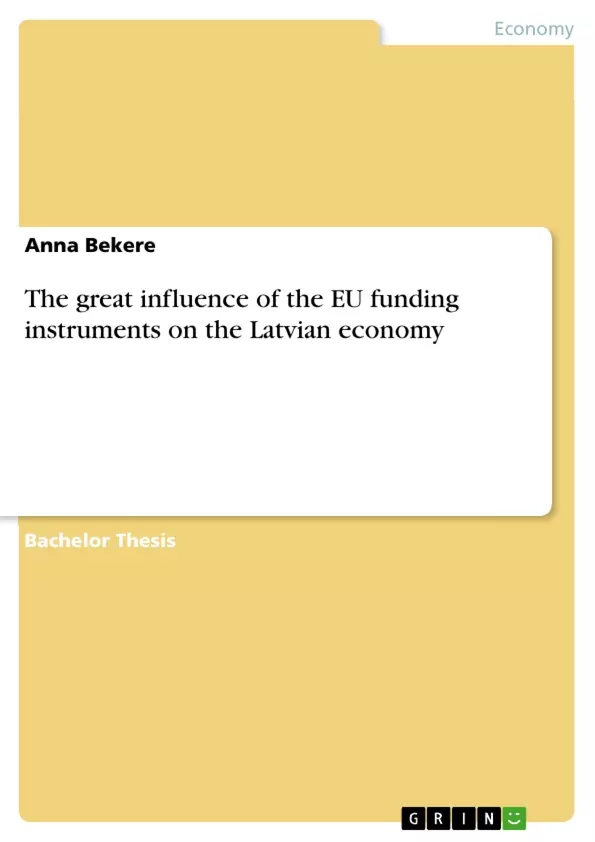This work describes the great influence of the European Union (EU) funding on a variety of economic sectors and functions of funds. It displays some of the macroeconomic statistics in relation to their contribution to the economic development agenda, evaluates the level of awareness of EU funding opportunities, and provides informed assumptions of the future without knowing the EU budget allocation strategy and its distribution between the target sectors.
The author elaborates on a short history of the early stages of the funds absorption of the EU. Furthermore, the work gives an insight regarding the existing financing mechanisms, a closer description of the most common source of financial aid to small and medium sized enterprises (SMEs), and an evaluation of future prospects of EU funding. The two questions of interest for the study are: "Is society really aware of the broad opportunities provided?" and "What will happen to Latvian economy after the end of the last planning period - is the implementation of these funds well-considered and utilized to its best ability?"
Nowadays, a noteworthy portion of Latvian citizens, both natural persons and owners of SMEs, have promising business ideas, but lacke funding and knowledge of ways to acquire it. Moreover, the current EU funds planning period will come to an end in 2020 without a clear vision of future EU stimulus towards building competitive and inclusive economy and their budgetary distribution.
Inhaltsverzeichnis (Table of Contents)
- Chapter 1. Introduction
- The background of the problem
- The background of the author's study
- Chapter 2. Objectives of the study
- Problem Statement
- Objectives of the Study
- Hypothesis Statement
- Limitations to the Study
- Chapter 3. Literature review
- Chapter introduction
- A brief history of the available EU funding instruments in Latvia
- EU pre-accession funds (ISPA fund, SAPARD programmes, Phare programme)
- Available funding instruments
- European Regional Development Fund
- Future without the support of EU funds: possibilities and alternatives
- Introduction to the Author's Discussion
- Chapter 4. Collection of Primary Data
- Methodology
- Research Design
- Type of Research
- Design of the Research Instrument
- Sample Selection
- Research Execution
- Analysis of Data
- Profile of Respondents
- Analysis of Responses
- Chapter 5. Intermediate Analysis and Conclusion
- Hypothesis Testing
- Intermediate Conclusions
- Chapter 6. Overall Conclusion and Recommendation
- Summary of Findings
- Overall Conclusion
- Recommendations on further study
- Lessons Learned / Learning Aspects
- Ethical implications
Zielsetzung und Themenschwerpunkte (Objectives and Key Themes)
This study investigates the impact of EU funding instruments on entrepreneurial development in Latvia. The author aims to analyze the effectiveness of these instruments, identify challenges, and provide recommendations for improvement. The study primarily focuses on the European Regional Development Fund (ERDF) and its role in promoting entrepreneurship in Latvia.
- The role of EU funding instruments in entrepreneurial development in Latvia
- The effectiveness of EU funding instruments in Latvia
- Challenges and opportunities associated with EU funding for entrepreneurs in Latvia
- Recommendations for improving the impact of EU funding on entrepreneurial development in Latvia
- The future of EU funding for entrepreneurs in Latvia
Zusammenfassung der Kapitel (Chapter Summaries)
Chapter 1 introduces the research topic, providing background information on the problem of entrepreneurial development in Latvia and the author's motivation for conducting the study. Chapter 2 outlines the study's objectives, hypothesis, and limitations. Chapter 3 delves into the literature review, exploring the history of EU funding instruments in Latvia, analyzing available funding instruments, and examining the potential challenges and opportunities facing Latvia in the absence of EU funds. Chapter 4 focuses on the methodology employed in the study, including the research design, sample selection, and data analysis procedures. Chapter 5 presents intermediate analysis and conclusions based on the primary data collected, while Chapter 6 summarizes the findings, draws overall conclusions, and provides recommendations for future research and policy.
Schlüsselwörter (Keywords)
The key terms and concepts explored in this work include EU funding instruments, entrepreneurial development, Latvia, European Regional Development Fund (ERDF), SME competitiveness, economic growth, policy recommendations, research methodology, and data analysis.
Frequently Asked Questions
What is the main focus of the study on EU funding in Latvia?
The study investigates the influence of European Union funding instruments on various economic sectors in Latvia, specifically focusing on entrepreneurial development and the role of the European Regional Development Fund (ERDF).
Which specific EU fund is highlighted in this work?
The work primarily describes the European Regional Development Fund (ERDF) and its significance as a source of financial aid for small and medium-sized enterprises (SMEs) in Latvia.
What research questions does the author address?
The author explores whether Latvian society is aware of the broad opportunities provided by EU funds and evaluates if the implementation of these funds has been well-considered and utilized effectively.
What are the key challenges identified for Latvian SMEs?
A significant portion of Latvian citizens and SME owners lack the necessary funding and knowledge to acquire EU stimulus, hindering the realization of promising business ideas.
What time period does the study cover regarding EU planning?
The study looks at the planning period ending in 2020 and discusses the uncertainty regarding future EU budget allocation strategies and their distribution across target sectors.
What methodology was used to collect data for this research?
The research involved the collection of primary data through a designed research instrument, sample selection, and subsequent data analysis of respondent profiles and responses.
- Citation du texte
- Anna Bekere (Auteur), 2017, The great influence of the EU funding instruments on the Latvian economy, Munich, GRIN Verlag, https://www.grin.com/document/494616



